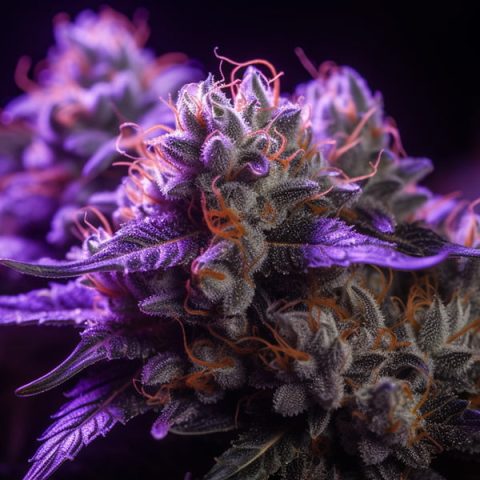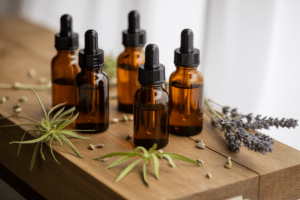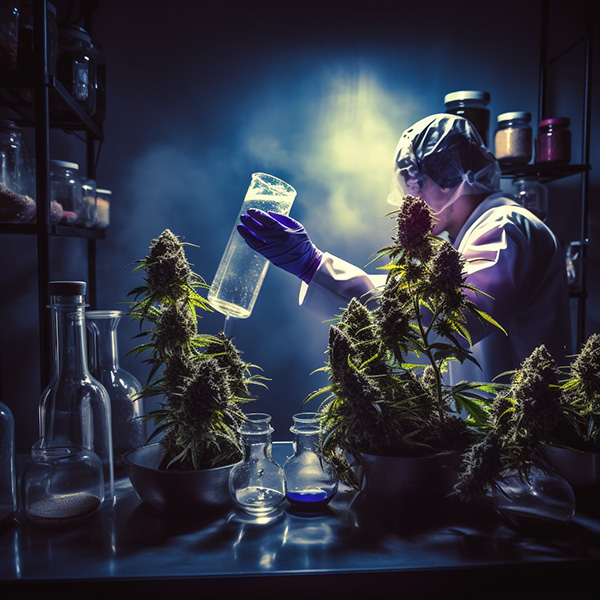THCA Cannabinoid: Unveil 5 Essential, Positive Insights

Contents
Contents
Unlock the Secrets of THCA Cannabinoid: 5 Key Insights into Its Health Benefits and Legal Status
Introduction to THCA Cannabinoid
Tetrahydrocannabinolic acid, commonly known as THCA, represents a pivotal cannabinoid in the cannabis plant’s natural composition. This non-psychoactive compound, nestled in the raw, unprocessed cannabis, serves as the precursor to the more widely recognized THC (Tetrahydrocannabinol). The transformation from THCA to THC, a process termed decarboxylation, occurs through heating—be it via smoking, vaping, or cooking. This conversion fundamentally alters the molecular structure, thereby activating THC’s psychoactive properties.
The importance of THCA extends beyond its role as a precursor to THC. Its presence in the cannabis plant signals the onset of a complex biochemical process, beginning with CBGA (Cannabigerolic acid), often referred to as the “mother of all cannabinoids.” As the plant matures, CBGA undergoes a transformation into primary cannabinoids like THCA and CBDA (Cannabidiolic acid).
Understanding THCA is crucial for grasping the broader implications of cannabis use, both recreational and medicinal. Its non-psychoactive nature has spurred interest in the scientific community, leading to investigations into its potential health benefits. These include anti-inflammatory properties and possible neuroprotective qualities, making THCA a significant focus in cannabinoid research. As we delve deeper into the nuances of cannabis compounds, THCA stands out for its unique role in the plant’s lifecycle and its emerging potential in various therapeutic applications.
The Science Behind THCA
The journey of THCA (Tetrahydrocannabinolic acid) in the cannabis plant is a fascinating tale of botanical chemistry. This journey begins with the foundational cannabinoid, CBGA (Cannabigerolic acid). Often dubbed the “mother of all cannabinoids,” CBGA is the primary building block from which THCA and other cannabinoids are derived.
As a cannabis plant matures, enzymes specific to the plant convert CBGA into various cannabinoids, one of which is THCA. This conversion is a critical step in the plant’s development, as THCA embodies a majority of the therapeutic properties attributed to the plant. Chemically, THCA is distinguished from THC by an additional molecular carboxyl ring. This structural difference is crucial, as it prevents THCA from binding to CB1 receptors in the brain, the main receptors involved in creating the psychoactive effects associated with THC.
The transformation of THCA into THC, a process known as decarboxylation, occurs through the application of heat. When cannabis is smoked, vaped, or cooked, the heat removes the carboxyl ring from the THCA molecule, converting it into the psychoactive THC. This chemical reaction is not only pivotal in understanding the effects of cannabis consumption but also in harnessing the plant’s potential for various applications.
The presence of THCA in cannabis plants is not constant; it varies depending on several factors, including the plant’s strain, growing conditions, and maturity. Typically, the THCA content in cannabis buds can range from 0 to 30 percent. Understanding the levels of THCA is essential for both consumers and medical practitioners, as it influences the potency and effects of the final product, whether it be for recreational use or therapeutic purposes.
In summary, the science behind THCA is a testament to the complex and intricate nature of cannabis as a plant. The processes that convert CBGA to THCA and then to THC are central to understanding the plant’s pharmacological effects and its potential applications in both medicinal and recreational contexts.
THCA vs THC: Key Differences
THCA (Tetrahydrocannabinolic acid) and THC (Tetrahydrocannabinol) are closely related yet distinctly different cannabinoids found in the cannabis plant, each with unique properties and effects. The primary difference between these two lies in their chemical structure and the resulting psychoactive effects.
- Chemical Structure:
- THCA: This is the non-psychoactive precursor to THC. In its natural state, THCA contains an extra carboxyl group, which prevents it from binding effectively to CB1 receptors in the brain. This molecular structure is why THCA doesn’t produce intoxicating effects.
- THC: When THCA is exposed to heat, through processes like smoking or baking, it loses its carboxyl group in a reaction known as decarboxylation. This transformation converts THCA into THC, enabling it to bind efficiently with CB1 receptors and produce the well-known psychoactive effects.
- Psychoactive Effects:
- THCA: It does not induce the ‘high’ associated with cannabis. This makes it a point of interest for those seeking the therapeutic benefits of cannabinoids without psychoactive effects.
- THC: Known for its psychoactive properties, THC binds to receptors in the brain, leading to the euphoria or ‘high’ that cannabis is famous for.
- Therapeutic Uses:
- THCA: Though not intoxicating, THCA has shown promise in treating conditions like inflammation, nausea, and potentially neurodegenerative diseases. Its non-psychoactive nature makes it appealing for medical applications where the ‘high’ is undesirable.
- THC: It’s used for its pain-relieving properties, its ability to induce sleep, and for recreational purposes. THC has also been found effective in treating conditions like chronic pain, glaucoma, and in stimulating appetite.
In summary, while THCA and THC are derived from the same source, their differences in chemical structure lead to varied effects and uses. Understanding these differences is crucial for consumers and medical professionals alike, as it helps in making informed decisions about cannabis consumption and its applications.
Potential Health Benefits of THCA
THCA, the non-psychoactive cannabinoid precursor to THC found in cannabis, has garnered interest for its potential health benefits. While research is ongoing, preliminary studies and anecdotal evidence suggest several therapeutic properties.
- Anti-Inflammatory Properties: THCA has demonstrated potential as an anti-inflammatory agent. This makes it a subject of interest for treating conditions like arthritis and other inflammatory diseases. Its ability to reduce inflammation without psychoactive effects is particularly appealing for medical use.
- Neuroprotective Qualities: Emerging research suggests THCA may have neuroprotective properties. This indicates potential in slowing or preventing the progression of neurodegenerative diseases like Huntington’s disease and Parkinson’s. The non-intoxicating nature of THCA could make it a viable option for long-term treatment strategies in neurology.
- Treatment of Nausea and Appetite Loss: Like THC, THCA has shown promise in treating nausea and stimulating appetite. However, it does so without the psychoactive effects, making it a more suitable option for individuals who want to avoid feeling ‘high’.
- Potential in Treating Seizure Disorders: Preliminary findings suggest that THCA might be beneficial in managing seizure disorders. This area of research is particularly promising, given the non-psychoactive profile of THCA, which could offer a safer alternative for long-term use, especially in pediatric patients.
- Gastrointestinal Relief: Anecdotal evidence and early studies indicate that THCA might be beneficial in treating conditions like colitis and IBS (Irritable Bowel Syndrome). Its anti-inflammatory properties play a significant role in this potential therapeutic use.
In conclusion, the potential health benefits of THCA are vast and varied, spanning from anti-inflammatory and neuroprotective effects to aiding in gastrointestinal disorders and seizure management. As research continues to evolve, THCA’s role in medical cannabis is likely to expand, offering an alternative to those seeking the benefits of cannabinoids without the psychoactive effects of THC.
Methods of Consuming THCA
THCA, found in raw cannabis, offers various methods of consumption to tap into its potential health benefits. Unlike THC, which requires heat to activate, THCA can be utilized in its raw form, providing flexibility in how it can be incorporated into daily routines.
- Raw Cannabis Consumption: The simplest method is consuming raw cannabis. This can be done by directly eating fresh cannabis leaves or buds. This method ensures that THCA remains unconverted to THC, maintaining its non-psychoactive properties.
- Juicing: Cannabis juicing is a popular method for ingesting THCA. By juicing raw cannabis leaves and buds, individuals can consume THCA in a concentrated form. This method is especially beneficial for those seeking to incorporate THCA into a health-focused lifestyle, as it can be easily combined with other fruits and vegetables for enhanced flavor and nutritional value.
- THCA Tinctures and Topicals: Companies are increasingly producing THCA-specific products like tinctures and topicals. Tinctures allow for precise dosing and can be taken sublingually or added to food and drinks. Topicals, on the other hand, can be applied directly to the skin, which is particularly beneficial for localized pain or inflammation.
- THCA Edibles: Some edibles are designed to preserve the THCA content without converting it to THC. These products offer a discreet and convenient way to consume THCA, especially for those who prefer not to smoke or vape.
In conclusion, the methods of consuming THCA are diverse, catering to various preferences and needs. From raw consumption to specialized products like tinctures and topicals, these methods provide access to the potential health benefits of THCA without the psychoactive effects of THC. As the cannabis industry evolves, we can expect more innovative and targeted ways to consume THCA, further expanding its accessibility and applicability.
THCA in Drug Testing
THCA’s presence in drug tests is a topic of significance, especially for individuals who regularly consume cannabis products. While THCA itself is non-psychoactive, it can still be detected in drug screenings.
Most standard drug tests are designed to detect THC, not THCA. However, since THCA is the precursor to THC, its presence in cannabis products means that some amount of THCA may convert into THC when consumed. This conversion can occur even in minimal amounts during the smoking or vaping process. Consequently, a drug test might show a positive result for THC, indirectly indicating the presence of THCA.
Furthermore, the complexity of cannabis chemistry means that traces of THCA can often be found in various cannabis-derived products. This includes certain types of edibles, tinctures, and concentrates where complete decarboxylation (conversion of THCA to THC) may not occur. As a result, these products could contribute to a positive THC drug test result.
In summary, while THCA itself does not produce psychoactive effects and is not the primary target of most drug tests, its conversion to THC and the potential for incomplete decarboxylation in cannabis products can lead to positive THC results in drug screenings. This underscores the importance of understanding the nature of cannabis compounds and their implications in drug testing scenarios.
Legal Status of THCA
The legal status of THCA is complex, primarily due to its close association with THC and the broader legal landscape surrounding cannabis. Despite THCA being non-psychoactive, its classification often falls under the same legal scrutiny as THC because it is a precursor that can convert into THC.
In many jurisdictions where cannabis is illegal or strictly regulated, THCA is also subject to similar legal constraints. This is because possessing cannabis in any form, including THCA-rich variants, potentially contravenes laws against cannabis possession and use. The challenge lies in the fact that THCA is inherently present in most cannabis products, making its legal status intrinsically tied to that of the cannabis plant itself.
In regions where cannabis is legal for medicinal or recreational use, THCA is typically allowed under the same regulations. However, the nuances of these laws can vary widely. Some areas may have specific stipulations regarding the permissible levels of THCA in cannabis products, while others might regulate based on the potential for THC conversion.
In summary, the legal status of THCA is largely dependent on local and national cannabis laws. As legislation around cannabis continues to evolve, the legal standing of THCA will likely undergo further changes, reflecting the shifting perspectives on cannabis and its derivatives.
FAQs About THCA Cannabinoid
- What is THCA?
THCA, or Tetrahydrocannabinolic acid, is the non-psychoactive precursor to THC found in raw cannabis. It transforms into THC when exposed to heat.
- Does THCA produce a high like THC?
No, THCA does not produce intoxicating effects because it does not bind effectively to the brain’s CB1 receptors, unlike THC.
- How is THCA used medicinally?
THCA shows promise in anti-inflammatory treatments, neuroprotection, managing nausea, and potentially aiding in seizure disorders, among other health benefits.
- Can you consume THCA by smoking cannabis?
Smoking cannabis typically converts THCA into THC due to the heat involved, thus producing psychoactive effects. To consume THCA, it needs to be in its raw, unheated form.
- Will THCA show up in a drug test?
While THCA itself may not be the primary target of a drug test, it can convert into THC, which is commonly tested for, potentially leading to a positive result.
- Is THCA legal?
The legal status of THCA is complex and often follows the legal status of cannabis in a given region. Even though it’s non-psychoactive, its potential to convert into THC often places it under similar legal regulations.
Conclusion
In conclusion, THCA, a crucial yet non-psychoactive cannabinoid in cannabis, offers a unique perspective on the plant’s potential. From its intriguing transformation into THC through decarboxylation to its potential therapeutic benefits, THCA represents an important area in cannabinoid research. Its ability to provide health benefits without the psychoactive effects of THC opens up new avenues for medical applications. As the legal landscape and scientific understanding of cannabis evolve, the role and perception of THCA are likely to shift, highlighting the importance of ongoing research and informed discussion in this dynamic field.
Visit our blog for the latest news, insightful reviews, and top-quality cannabis articles.
References
Neurogan. (n.d.). THCA and THC: Two Different Cannabinoids. Retrieved from https://neurogan.com/blogs/news/thc-vs-thca
Leafly. (n.d.). What is THCA and what are the benefits of this cannabinoid? Retrieved from https://www.leafly.com
Canna Clinic. (n.d.). What is THCa: Thca vs Thc. Retrieved from https://www.cannaclinic.com
Insider. (n.d.). THCA: How It’s Different From THC and the Health Benefits. Retrieved from https://www.insider.com
Weed.com. (n.d.). THC vs THCA: Navigating the Complex World of Cannabis Compounds. Retrieved from https://weed.com
NuggMD. (n.d.). What is THCA? (THCA vs THC and Other Cannabinoids). Retrieved from https://www.nuggmd.com
CFAH. (n.d.). What is THCA and is It Different From THC? Retrieved from https://cfah.org
Herb. (n.d.). THC vs THCA: What’s The Difference? Retrieved from https://herb.co
High There. (n.d.). THC vs THCA | What’s the Difference & Why It Matters. Retrieved from https://highthere.com




